Water softener is a whole house filtration system that removes calcium and magnesium hard water minerals through an ion-exchange process. Hard water causes damage to appliances, leaves spot stains on surfaces, and dries out the skin and hair.
When choosing a water softener system, it’s important to consider the grain capacity, water flow rate, and the number of bathrooms (size) in your house.
The best water softener system in 2023 is the Springwell SS1 water softener. It comes with 80,000 grain capacity, 20 GPM flow rate and 1 – 7 bathroom size options.
If you’re looking for a whole house water filtration and softener system combo, you’ll be far-fetched to find a better deal than the Kind Water Systems E-3000, which offers a carbon filter & salt-free water softener at a considerably lower price than other competitors.
Water Softener Comparison Table
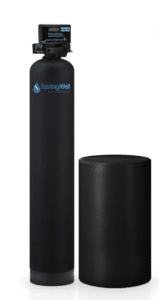
- Type: Ion Exchange
- Grain Capacity: 32,000 grains
- Flow Rate: 11 – 20 GPM
- Warranty: Lifetime
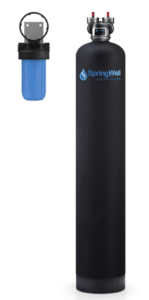
- Type: Template Assisted Crystallization
- Grain Capacity: 35,000 grains
- Flow Rate: 15 GPM
- Warranty: Lifetime
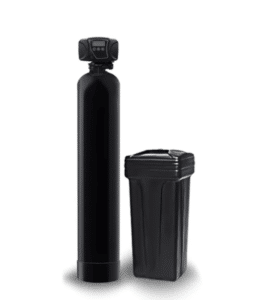
- Type: Ion Exchange
- Grain Capacity: 24,000-64,000 grains
- Flow Rate: 7-15 GPM
- Warranty: 5-10 years
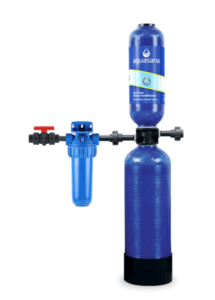
- Type: Template Assisted Crystallization
- Grain Capacity: 42,000
- Flow Rate: 7 GPM
- Warranty: 6 years
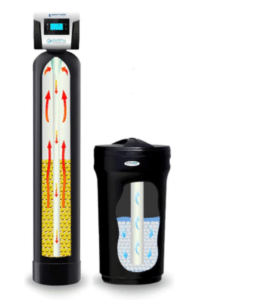
- Type: Ion Exchange
- Grain Capacity: 24,000-110,000 grains
- Flow Rate: 10-32 GPM
- Warranty: Lifetime
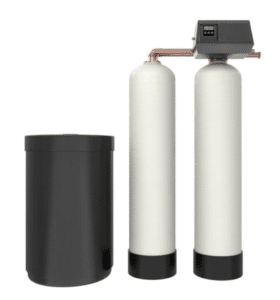
- Type: Dual Tank (Ion Exchange)
- Grain Capacity: 24,000-1,200,000
- Flow Rate: 250 GPM
- Warranty: 5 years
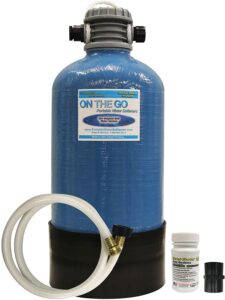
- Type: Ion Exchange (Salt or potassium)
- Grain Capacity: 16,000 grains
- Flow Rate: 5 GPM (varies based on water supply)
- Warranty: 1 year
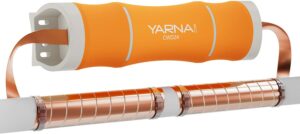
- Type: Electromagnetic
- Grain Capacity: No limit
- Flow Rate: No limit
- Warranty: 10 years
Best Water Softeners:
- Best Overall: Springwell SS1 Water Softener | Jump to Review
- Best Salt-free: Springwell Salt Free | Jump to Review
- Runner Up Salt-Based: Fleck 5600SXT | Jump to Review
- Runner Up Salt-free: Aquasana Water Softener | Jump to Review
- Best Electronic Descaler: Yarna Capacitive | Jump to Review
1. Springwell SS1 – The Ideal Salt Based Whole House Water Softener
The Springwell SS1, with its large grain capacity, quality components, and high flow rate is our top pick for best overall salt-based water softener. This system works with both city and well water, and it also tops our list of best well water softener systems.
The Springwell CF1 decreased the use of detergent by a staggering 40% in washing machines!. Fruits and veggies washed with water coming out of this water softener were much cleaner and tasted better. The skin and hair health also improved thanks to the system removing calcium and magnesium minerals that makes the skin look dull. Simply put, it’s really well-rounded and probably the only softener you’ll need for the entire house.
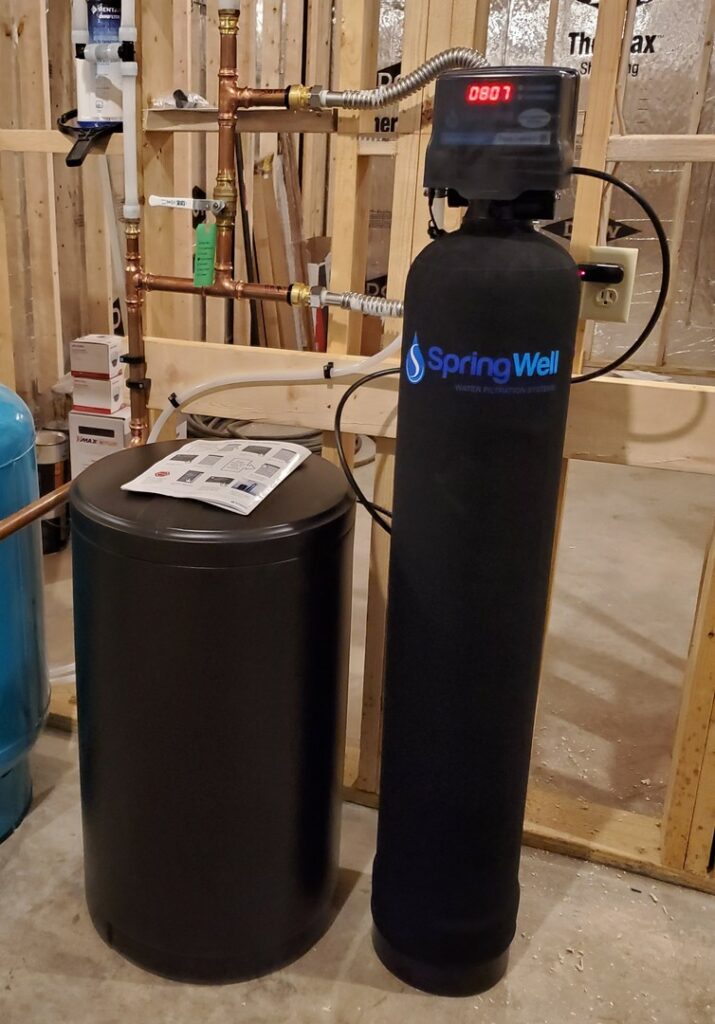
The Springwell SS1 has 32,000 grain capacity, which is ideal for houses with 1-3 bathrooms. However, there are other sizing options that can reach up to 80,000 grains capacity as well, which can easily provide for large homes with 7+ bathrooms.
One of the standout features is the Salt System head, which connects to the Springwell app on your phone via Bluetooth. This feature ensures easy tracking and control by allowing the user to monitor the overall condition of the system and manage critical settings like salt usage and regeneration frequency.
Maintaining the Springwell salt-based water softener is easy. The only regular maintenance requirement is to add salt to the brine tank once or twice a year. The brine tank holds up to 200lbs of salt and consumes roughly 40lbs of salt every 1-2 months.
In addition, the regeneration process is seamless. It is automatic and usually occurs in the late evenings or early mornings without causing any disruption to its main function. The process takes roughly 30-60 minutes, which is faster than many other water softeners.
For a large salt-based tank, it is surprisingly easy to install for both professionals and DIYers with no plumbing experience. The average installation time is 1-3 hours for DIY installation, thanks to the precise installation manual that comes with the system. There’s also a step-by-step installation video on YouTube.

- Type: Ion Exchange
- Grain Capacity: 32,000 grains
- Flow Rate: 11 – 20 GPM
- Warranty: Lifetime
- High flow rate
- Low maintenance
- Highest quality components
- Experienced brand in the industry
- Bluetooth capabilities
- Large units for small spaces
2. Springwell FS1 – The Ideal Salt-Free Water Softener System
The FutureSoft FS1 Salt-Free model is the best salt free water softener because it doesn’t release any salt brine to the environment and reduces water waste to a great extent. It also does a great job of prolonging the lifespan of clothes and kitchen appliances and improving hair and skin health. Despite its other many benefits, it’s easy to install and take care of, too!
Similar to the Springwell SS1 above, this salt-free model offers a minimum of 12 GPM flow rate capacity which is ideal for 1-3 bathroom households. With upgrades, it can also reach up to 20 GPM for large abodes with 7+ bathrooms.
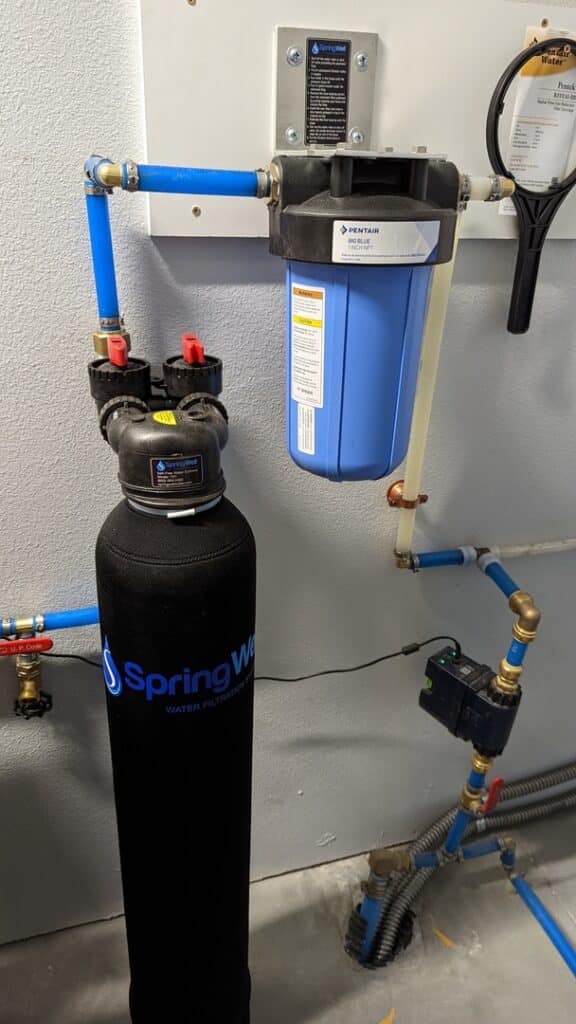
This system is a bit pricier than other water softeners, but the high cost is justified by the fact that it doesn’t require salt. It’s also a completely electric-free system, proving more economical in the long run.
Additionally, the ActivFlo Technology won’t let the water pressure drop no matter the active water flow rate. Compared to similar products in the market, that surely comes across as a standout feature for the Springwell Salt-Free.
Installation and maintenance requirements are very minimal. Installation time takes roughly 2 hours and can be done with minimal plumbing experience. There’s almost no required maintenance except for the occasional micron pre-filter replacement every 6 to 9 months.
However, please note that salt-free water softeners work differently from salt-based systems in the way they soften water. They neutralize calcium and magnesium ions rather than completely remove them from hard water. In the end, they’re still there, but they won’t stick to appliances nor create stains, corrosion, or damage.
Overall, this is a low-maintenance, eco-friendly water softener that improves water quality. If you want a softener that destroys all the hard water minerals rather than conditioning them, it might be better to stick to salt–based options.

- Type: Template Assisted Crystallization
- Grain Capacity: 35,000 grains
- Flow Rate: 15 GPM
- Warranty: Lifetime
- Low-maintenance
- Easy to install
- Doesn’t need electricity
- Doesn’t need a sink or drain
- No salt needed
- No slipper feeling
- Hard elements in the water are not removed but only neutralized
3. Fleck 5600SXT
The Fleck 5600SXT isn’t as technologically innovative as other products on our list nor is it made of high-end materials like the Springwell SS1, but it still gets rid of hard water.
More importantly, it gives fruits and veggies a new taste, appliances better longevity, and hair and skin a softer touch. The best part? It’s much more affordable compared to the high-end options on the market, and that’s why it’s a worthy runner-up to the Springwell SS1.
Similar to the Springwell entries, the Fleck 5600SXT can be installed in roughly 2 hours, thanks to the simplified installation manual and videos. Installation can be carried out by professionals and DIYers without experience, alike.
As with most water softeners, you have complete control of the regeneration process via its one-line LED valve display. You can set it to automatically regenerate at a preset time or have it regenerate on-demand whenever it suits you.
Although its parts aren’t made of high-end materials, its inner layer of resin is fortified by a cross-link system, which makes it more resistant to chlorine and more durable overall. However, it lacks premium qualities such as a vacation mode, automatic reserve, and proportional salt-brining.
Fleck offers a warranty on each component of the system. The tank has a warranty of ten years, the resin has no warranty, and all other parts have a five-year warranty. While this isn’t the best deal compared to the lifetime warranty on Springwell softeners, the customer service is top-notch in responding to user requests.

- Type: Ion Exchange
- Grain Capacity: 24,000-64,000 grains
- Flow Rate: 7-15 GPM
- Warranty: 5-10 years
- Affordable
- Plenty of size and capacity options
- No change in water pressure
- Easy DIY install
- Extends appliance lifespans
- Very effective in lowering hardness
- Cycle control
- Limited warranty
- Lesser in material quality compared to other high-end softeners
4. Aquasana Salt-Free Water Conditioner
The Aquasana Salt-Free Water Conditioner is also a salt-free softener that conditions the water rather than softening it. The minerals and ions present in the hard water are crystallized and neutralized after the water is processed.
Considering all its valuable features, the fact that it only costs about $800 is surely a bargain and it makes a good, budget-friendly runner-up to Springwell’s salt-free model. Moreover, it’s one of the most eco-friendly options on the market. It eliminates water waste and prevents salt and chemicals from being released into the environment.
While the flow rate isn’t incredibly high, it’s enough to serve most residential homes with several bathrooms. The 42,000 grain capacity is impressive considering the size of the tank and system.
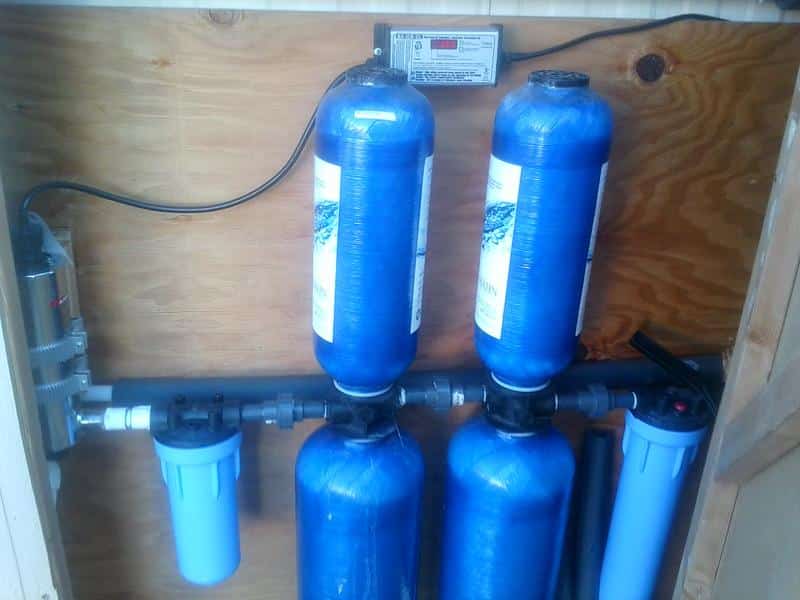
Note that the pre-filters need to be changed on a bi-monthly basis. They distribute potassium and prevent many minerals and small particles from entering the water without the use of salt or resin. So, magnesium and calcium ions might slip through if the pre-filters aren’t changed timely. Furthermore, not replacing the pre-filter could also impact the flow rate, forcing the water softener water pressure to drop.
Replacing the filters is simple, but it is something you have to remember to do about every two months, which can be a hassle for busy homeowners.

- Type: Template Assisted Crystallization
- Grain Capacity: 42,000
- Flow Rate: 7 GPM
- Warranty: 6 years
- Inexpensive
- Eco-friendly
- Lightweight
- No water waste
- No salt needed
- No electricity needed
- Pre-filter and neutralization system
- Must replace pre-filters bi-monthly
- Less than perfect installation instructions
5. SoftPro Elite
This salt-based water softener by SoftPro Elite is another great option with high-quality components. It’s also an eco-friendly product even though it’s not salt-free.
Unlike most of its counterparts, it has an up-flowing regeneration process rather than down-flow. The system works to push the hard minerals upward through the depleted resin and out to drain. As a result, it saves more water (64%), salt (75%), and energy (68%) than its alternatives.
One of the best aspects of this model is the many size and capacity options available. The options range from 24,000-grain to 110,000-grain capacities. While 24,000 is often plenty for smaller households, the larger ones find their use in bigger homes or workplaces.
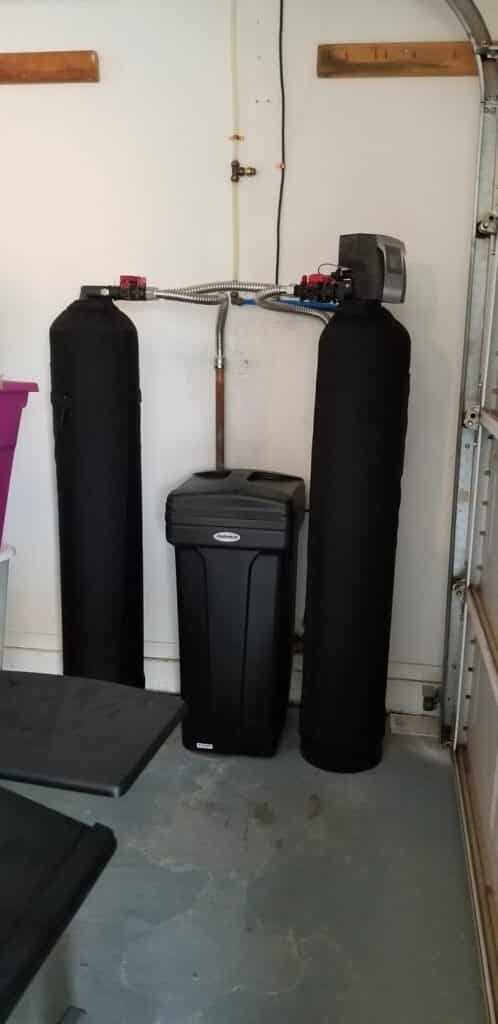
The SoftPro Elite is reasonably priced, especially considering how much savings it enables. Despite the low price, it does have a high-flow programmable control valve and bypass valve, giving you complete power over the flow rate. It also helps you monitor how well the system is functioning. In addition, it automatically cleans itself if it goes unused for seven days to prevent bacteria growth and ensure smooth performance.
While the installation isn’t necessarily difficult, it’s more intensive compared to other softeners on this list. It takes a minimum of four hours for professional installation. For DIYers, you’ll need much more time than that. The drastic difference between the installation guide and the complete instruction manual doesn’t help the matter either, so asking a professional would be the safest course of action.

- Type: Ion Exchange
- Grain Capacity: 24,000-110,000 grains
- Flow Rate: 10-32 GPM
- Warranty: Lifetime
- Relatively eco-friendly
- Saves water and salt
- Plenty of size and capacity options
- Programmable valve meter
- High flow rate
- High-quality components
- Unreliable quick installation guide
- Long installation process
6. Pentair Fleck 9100 Dual Tank Softener
Pentair Fleck 9100 is the best option to soften water in large residences, restaurants, schools, and other commercial spaces. Its massive dual tank is a beast and can function at an incredible 250 GPM flow rate. Pentair’s largest model has a staggering grain capacity of over a million.
The system features an adjustable 3- or 5-cycle control that allows the owner to regulate the water flow for efficiency. The reliable water treatment system works continuously to maintain a higher water supply in commercial facilities than on residential properties that have lower water consumption.
The system uses 8% cross-linked resin, making it more durable. However, this design necessitates that you clean the resin more often. Overall, the maintenance of a dual-tank softener for commercial use will require more care than a residential one.
The system is also very user-friendly and safe to operate. The safety brine bypass valve with an air check offers some peace of mind in that regard, making it absolutely foolproof.
The installation process is difficult simply because there are two tanks to incorporate. So, it’s wise to call a professional and eliminate potential frustration.
One thing to note is that since the tank is designed to handle a high flow rate and soften larger amounts of water, the timing of the softening process is inevitably a bit on the lower side. The water processed through the Pentair Fleck 9100 also tends be a bit slippery and may not be ideal for showers.

- Type: Dual Tank (Ion Exchange)
- Grain Capacity: 24,000-1,200,000
- Flow Rate: 250 GPM
- Warranty: 5 years
- Reduces hardness thoroughly
- Inexpensive for the size and capacity
- Long-lasting design
- Impressive GPM
- Plenty of options for size and capacity
- Very slippery soft water
- Intensive installation
- Limited warranty
7. On The Go Portable RV System
Sometimes, one of the biggest problems when driving around the countryside in your RV can be the quality of the water. The On The Go water softener is the solution to that problem. Once it’s hooked to the plumbing system of an RV, it’ll improve the water quality while also prolonging the lifespan of the plumbing system itself.
Its weight of 32 pounds might be a problem for some, but its easy-carry handle further fortifies its status as the best portable option. The flow rate depends on the water source of the RV, but it’s always at least 5 GPM. The grain capacity of 16,000 is more than enough to handle an RV’s water demands.
With just two boxes of table salt, it’s able to provide softened and tasty drinking water for more than 40 days and at a capacity of up to 1,600 gallons. The regeneration cycle is quick and effective, wasting very little water.
The entire water softening process should never take more than an hour, and once you know how to do it, it usually takes about only 30-40 minutes to complete.
The unit costs less than $300. While there are cheaper alternatives on the market, they are usually less effective and won’t last as long. The On The Go Double Standard model has a high-grade, premium resin bed, and its tank is made of durable metals, so it’s more than capable of handling long-term wear and tear.
The installation process is quite simple, so you’ll likely be able to install it yourself with the help of a manual. The water softener actually doesn’t require any tools or electricity to set up and get running. It’s also low-maintenance and only requires sanitization after about two years of use. All that considered, it’s a valuable investment for any RV.

- Type: Ion Exchange (Salt or potassium)
- Grain Capacity: 16,000 grains
- Flow Rate: 5 GPM (varies based on water supply)
- Warranty: 1 year
- Larger than other on-the-go models
- Compact design
- Affordable
- Excellent grain capacity for the size
- Lightweight
- Little salt needed
- Can substitute salt with potassium
- Lack of control over the flow rate
- Hands-on regeneration cycle
8. Yarna Capacitive Water Descaler
Yarna Capacitive electric water descaler is an impressive piece of technology. It has no limit on the flow rate or grain capacity, and can be adjusted to any flow speed to descale any amount of hardness in the water.
Similar to the salt-free entries in our list, the Yarna Capacitive doesn’t remove hard water minerals from the water. Instead, it just changes the physical structure on a molecular level. In turn, these minerals won’t cause any scaling or corrosion on your appliances and dishes.
The electric pulses generated within the electronic unit are controlled by a microchip. The microchip allows the user to control both the flow rate and grain capacity, so the softener can work perfectly regardless of how hard or soft the water is.
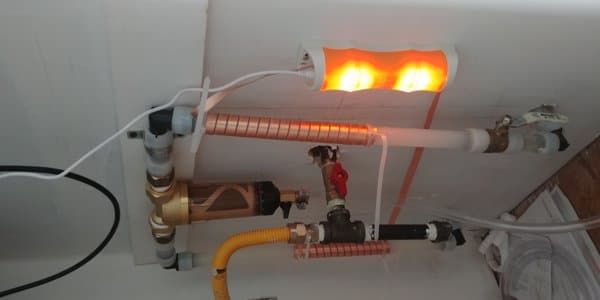
The installation process is the simplest of all the products mentioned in this article, taking only 15 minutes to set up with no help from a professional. The manufacturer boasts that the unit is completely maintenance-free, making it the most practical model for long-term use as well.
Yarna is so confident in its product that it offers a ten-year warranty and a one-year money-back guarantee. While other electromagnetic water softeners can cost thousands, this unit only costs about $300.
Note that the system is excellent for the most part but can take as much as three months to start working effectively since the electromagnetic pulses need to adjust to the water hardness and function perfectly. However, once you find the right settings, the system can be very effective.

- Type: Electromagnetic
- Grain Capacity: No limit
- Flow Rate: No limit
- Warranty: 10 years
- Extremely small and compact
- Easiest installation of all
- Less expensive than traditional whole-house softeners
- No salt needed
- No water waste
- Eliminates mineral buildup excellently
- It may take a while to work
How We Reviewed Home Water Softener Systems
We reviewed water softener systems based on four important aspects:
Flow Rate:
The flow rate of a water softener is calculated by gallons per minute (GPM). Various aspects play into the flow rate of a softener, including the bypass valve, control valve, mineral tank, and distribution system. The volume and type of ion exchange softening resin will also play a factor in determining the number.
If the flow rate of a softener isn’t enough to meet your water consumption needs, then you may experience water softener low water pressure. The ions may slip through as well, making your water slightly harder than it should be.
The higher the flow rate, the better the water softener will work. However, for smaller homes with little running water, an oversized softener will be an unnecessary purchase. More often than not, a decent softener with a flow rate of 12 GPM will be enough to provide for a regular house that has 1-3 bathrooms.
| Water Softeners (Best to Worst) | Flow Rate |
|---|---|
| Yarna Capacitive Water Descaler | Unlimited |
| Pentair Fleck 9100 Double Tank | 250 GPM |
| SoftPro Elite | 10-32 GPM |
| Springwell Salt Based | 12-20 GPM |
| Springwell Salt-Free | 12-20 GPM |
| Fleck 5600SXT | 7-15 GPM |
| Aquasana Salt-Free Conditioner | 7 GPM |
| On the Go Portable | 5 GPM |
Grain Capacity (Grains)
Grain capacity is a common term to describe the quality of a water softener. Grain capacity is the amount of hardness that a water softener can remove. There are two factors that play a role in determining the grain capacity: the resin inside the tank of the softener and the sodium coat over that resin.
As the number of calcium and magnesium ions it can trap in the resin gets higher, the grain capacity of a softening system will also increase. This process depends on the amount and the quality of the resin. Similarly, the amount and quality of the sodium or potassium coat over the resin determines whether it can trap a good number of harmful minerals.
When looking at grain capacity, it’s helpful to know how many grains will be removed per pound of salt. This piece of information gives an idea about the capacity and efficiency of the water softener system.
| Water Softeners (Best to Worst) | Grain Capacity |
|---|---|
| Yarna Capacitive Water Descaler | Unlimited |
| Pentair Fleck 9100 Double Tank | 24,000-1,200,000 |
| SoftPro Elite | 24,000-110,000 |
| Springwell Salt Based | 32,000-80,000 |
| Springwell Salt-Free | 32,000-80,000 |
| Fleck 5600SXT | 24,000-64,000 |
| Aquasana Salt-Free Conditioner | 42,000 |
| On the Go Portable | 16,000 |
Maintenance Requirements
Like most household appliances, a water softener has some maintenance requirements to ensure it functions properly. An essential part of maintenance is the initial setup, where you choose the settings for the regeneration cycle frequency, length, time, and salt dosage for every cycle.
Some products on the market have more flexible settings, making it easy to control and regulate the water softener, and some might need you to keep the instruction manual close by.
Unsurprisingly, you also must clean the water softener system components ever so often. Some components only need to be cleaned every few years, while others will require a lot more attention, as will be specified in the manual. If you tend to forget or neglect your housekeeping, you’ll want to opt for a water softener with little and infrequent maintenance.
Price
The price of a water softener ranges from $500 to $6,000, depending on the capacity, quality, and purpose. Of course, a small product designed for RVs and a huge double-tank one designed for large industries cannot share the same price. However, the price of the products on our list range from $300 to $2,000, which is reasonable.
| Water Softeners (Best to Worst) | Price |
|---|---|
| On the Go Portable | $285 |
| Yarna Capacitive Water Descaler | $299 |
| Aquasana Salt-Free Conditioner | $799 |
| Fleck 5600SXT | $1,189 |
| Pentair Fleck 9100 Double Tank | $1,248 |
| SoftPro Elite | $1,369 |
| Springwell Salt-Free | $1,530 |
| Springwell Salt Based | $1,597 |
Honorable Mentions
Below are some honourable mentions that didn’t quite make the cut but are still worth bringing to your attention:
US Water Systems Matrixx:
The Matrixx uses traditional ion exchange and is a bargain given the size of the unit. It has options for flow rate and grain capacity, so you can choose the best one for your needs. It wastes less water and salt than many of its counterparts to complete the regeneration cycle, so it’s also eco-friendly. However, the eco-friendly aspects slightly compromise its effectiveness.
AquaOX WS:
The ion exchange model by AquaOX is a decent option with features you might need. It has a high grain capacity and an good adjustable flow rate. However, it’s much more expensive than the options on our list.
Crystal Quest Commercial Softener:
The Crystal Quest Commercial Softener is an excellent choice for commercial properties, but it costs even more than the AquaOX WS. It has many capacity and flow rate options and can also function as a dual-tank system when combined with another brine tank. It’s hard to find anything wrong with this product other than the high price that discourages many.
Water Softener Questions & Answers
Below are common questions concerning water softening systems in homes:
The average cost of softener systems for residential houses is about $1,500. Size and capacity are the main factors that influence the price of a water softener.
The best place to install it is at the earliest possible point in your plumbing. It is recommended that you place it right before your water heater. Placing it after the water heater may allow some of the hard water to flow to certain taps and faucets around the building, which may reduce its efficiency.
Water softener installation requires an electric outlet with at least 120-volt capacity, a sink or drain to discharge the backwash, and a plumbing loop (water softener loop) or some space between the water inlet and the softener.
If you do not have all three of these things, you will need to put in more work and money to set up the system.
Those who have some plumbing experience can easily install one on their own, especially if the instruction manual is simple. However, professional installation isn’t too expensive either, and it might be worth it to ensure that there’ll be no problems later on.
The average lifespan of a water softening system is about 12 years. However, it depends on the quality of the materials, how well it’s maintained, and how frequently it is used.
Springwell, Fleck, and SoftPro are the most popular brands on the market.
Other water softener brands:
– Rheem water softener
– AO Smith water softener
– Kinetico water softener
– Rainsoft water softener
– Sterling water softener
– Culligan water softener
– Waterboss water softener
– Clack water softener
– Kenmore water softener
Related Water Softener Guides for Different Uses:
- Water softener for pools
- Water softener for washing machine
- Water softener for apartment
- Water softener rental vs buying
Conclusion
In conclusion, we recommend the SpringWell SS1 for mid to large households. Get it if you’re looking for a salt-based ion exchange system to get rid of hard water. The Fleck 5600SXT, on the other hand, is a worthy salt-based runner-up and a more affordable one at that.
If you want a salt-free solution, we recommend the SpringWell FS1 model, which has similar capacity to the SpringWell SS1 but doesn’t require salt. The Aquasana is another decent salt-free option, and it’s much more budget-friendly than the SpringWell SS1.
For large-scale use, we recommend the Pentair Fleck 9100 dual tank softener with up to 1.2m grain capacity. This water softener is the best choice for commercial businesses or homes with extremely hard water.
Lastly, we definitely recommend the Yarna Capacitive descaler as it’s cheap, experimental in the way it softens the water, and has an unlimited water capacity as well as flow rate.